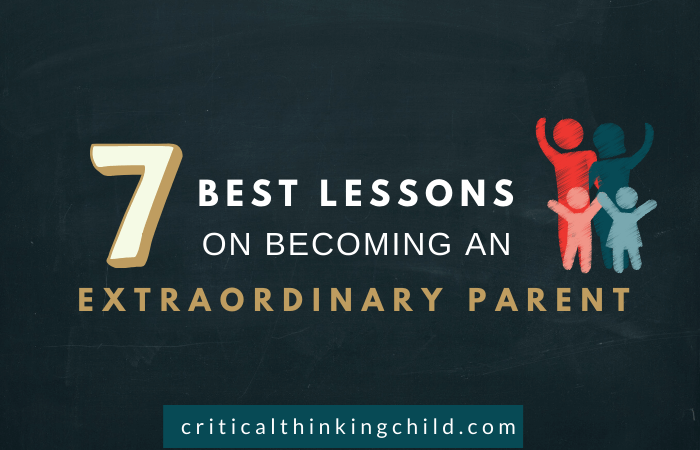If you’re like me, you start to become reflective at the end of the year. It’s a natural time to look back and take stock of what has changed, and that’s particularly true when you’re a parent. Parenting is the most important jobs you’ll ever have, and no two days are the same. Every year brings new lessons, new celebrations, and new challenges.
Recently, we published a post about how you can show up a Superstar Parent. The truth is, this is something parents strive for, constantly — myself and The Critical Thinking Team included. As the year winds down, we wanted to share some of the takeaways from the endless, rewarding, messy, invigorating, and beautiful journey to becoming a better parent.
Here are some lessons learned by the CTC team in 2019. From strengthening your relationships to being true to yourself, we hope some of them will resonate with you and yours!
Lesson #1: Focus on Improving in a Specific Area
Just like you don’t expect your child to excel in all areas, it’s unrealistic to expect to be an exceptional parent in all areas.
We’re just like our kids in this respect. Your child may show gifted potential in math, but take more time to grasp reading comprehension. Children develop in different areas at different rates — this is called asynchronous development, and it’s perfectly normal. In fact, it’s expected!
Your parenting may be much the same. Even gifted adults usually aren’t gifted across the board. So, instead of trying to check all the boxes, find your specialty as a parent. Maybe you’re great at guiding your child through learning activities (or maybe you’ve realized that you’re not the best tutor). Maybe you know exactly how to comfort your child when they’re upset. Or perhaps you’re more adept at forging strong relationships with other parents and teachers to make sure your child has the support they need outside of school.
Focus on a specific area of parenting that you enjoy. This doesn’t mean that the other areas are ignored, but it does allow you to excel in one specific area. How do you know what to focus on? Pay attention! You may notice that other parents ask you about a specific aspect of parenting regularly. Or maybe you discover that there’s a part of your role as parent you look forward to more than others. Once you’ve pinpointed your area, dig into it. Spend some time reading up on this aspect of parenting, talk to others about it, and make sure you really have it down.
Lesson #2: Don’t Jump Ship
Sustained success is not instant. This is true for parents and children alike. Whether you’re evaluating your own parenting techniques or whether your child is grasping a new concept, it can be tempting to switch tactics constantly. Unfortunately, taking this approach can cause more harm than good!
Be patient with yourself and your child. Just like you don’t allow your child to quit the soccer team because their first practice is bad, you don’t want to abandon the materials and processes you’re using because you don’t see progress right away.
Instead, take your time and reflect frequently. If something doesn’t work, approach it with curiosity — this is what a growth mindset is all about! In the academic sense, remember that new methods and materials take time to work, especially if your child is fairly far behind. This is why it’s so important to start early when helping your child progress academically (but if your child is older, don’t worry — the same methods still work, they may just require more patience).
Lesson #3: Cultivate Connections
That old phrase, “it takes a village” applies here. It’s so easy to feel like you and your partner (if you have one) are in it alone in the parenting game. But parenting is not an island. It takes the work of an entire community — parents, caregivers, teachers, tutors, friends, and family — to raise a child. Because of this, nothing is more important than the connections you cultivate.
Build relationships with like-minded parents and educators. Invest in friendships by being open with others, asking about their lives and children, and volunteering to help when they need it. It’s not easy to balance work and family life, so it’s incredibly helpful to have someone outside your family to listen and understand.
Just like children learn best from each other at school, and can’t succeed completely by themselves, adults need one another to learn from and grow with as well.
Lesson #4: Prepare to Invest Wisely
Society is full of shiny objects that promise to immediately resolve parenting problems. Whether it’s the hottest new toy on the market, new summer camps, or the promise of an unforgettable family vacation, parents are inundated with options. It’s overwhelming, and it can be hard to know where to spend your hard-earned money.
Parenting is an investment, but you don’t need to break the bank — and all that glitters is not gold. Sometimes you will spend money on a product or curriculum that isn’t flashy and doesn’t come with a guarantee of immediate results. That’s because it’s a long term investment in your child’s future, not a quick fix. And even if the initial results aren’t there, the overall gains can be huge, if you stick with it.
You don’t expect your child to jump from picture books to chapter books overnight. It’s a slow, steady process of gaining skills, practicing, and gradually moving to more difficult content. For example, our critical thinking workbooks get gradually more difficult as students progress. It’s the same with the investments you make for your child.
Be patient and don’t expect instant gratification. Sometimes your have to take a leap of faith and trust that in time you’ll see the results you’re looking for.
Lesson #5: Trust Yourself
Sometimes there can be too many cooks in the proverbial kitchen. And while connection is important (see Lesson #3), too much input can become paralyzing.
When others offer you free advice, check in with yourself before acting on it. Every family is different, and every parent approaches their job differently, so it’s important to make sure the advice feels right for you. Don’t let others decide for you because you’re too scared to decide for yourself.
Choosing the right preschool for your child to attend is a perfect example. The number of options available is already overwhelming. When you throw in parent opinions about various schools, it can become almost impossible to navigate. Every opinion about the school’s reputation, the experiences their child had, the quality of the teachers, and more is just that… an opinion. When you make your final decision, it needs to come from your own understanding of what’s best.
Remember, you’re the head chef. You may have a lot of people in your corner, but at the end of the day, you make the final decisions. When you’re making major educational decisions for your child and family, like choosing a school, you have to go with what feels right for your family.
Lesson #6: Monitor Your Mindset
Just like your children need to learn to persevere, they can learn this behavior from the adults in their lives. Think about how you support your child when they face failure. If you’ve spent time helping them develop a growth mindset, you probably remind them that failing is a part of learning. You likely help them reframe their negative thoughts and think about how much they’re growing each and every time they try.
The same philosophy applies to parenting. You’re going to make mistakes — we all do. As a family, change your culture so that instead of hiding from, apologizing for, and scrambling to fix mistakes, you celebrate mistakes and learn from them. Show your child how a misstep can actually turn into an opportunity, and you’ll help to boost their confidence.
Focus on the process of learning and growing, and enjoy the journey!
Lesson #7: Plan, Plan, Plan!
If you fail to plan, you plan to fail. Grab a notebook or journal and document your goals for yourself and your family.
Think about how you help your child approach a big project. You don’t just dive in and hope for the best. You break it down into smaller chunks and tackle it one piece at a time. Similarly, you can break large tasks up into smaller chunks. Making a plan will help everyone feel under control and purposeful.
As a caveat, don’t cling so tightly to the plan that it rules your life. Parenting is unpredictable, and your plan won’t always come to fruition. That’s okay! When something unexpected comes up, you can model how to adjust course. Your child will pick it up and respond similarly when their own plans get interrupted or changed.
What Lessons Did You Learn in 2019?
As the year winds down, we want to hear from you! What parenting lessons did you learn? What are you celebrating, and how did you approach unexpected challenges?
Let us know in the comments, and have a wonderful New Year!




I appreciate you sharing this perspective. These are pretty loaded reflections and I can honestly say, many resonate with me. My goal is to chose an area wisely with my boys school journey, monitor more often and support them when times get tough; especially for my 5th grader whose seems to see Absolute value, exponents etc. in math as his enemy. Balancing family, work, professional and personal aspirations can be a beast as a parent, however I’m in it to win it. Thank you I’m pausing to reflect more..